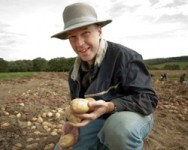Event Details
Date
September 2, 2015
Time
5:30 PM - 8:45 PM
Location
William's home farm, down the lane off Russell Rd
Across from the packing house at 5077 Russel Rd
Marion, NY 14505
Cost
At the Door
$10.00 if enrolled in the Cornell Vegetable Program
$15.00 all others
Host
Cornell Vegetable ProgramCarol MacNeil
585-313-8796
email Carol MacNeil
Potato Varieties, Late Blight, and Insect Management Meeting
September 2, 2015
Potato growers have an opportunity to view standard and new fresh market potato varieties and lines, hear how to reduce risk in this year's late blight epidemic, and discuss Colorado potato beetle and other insect management. The meeting will be held Wednesday, September 2, 2015, 5:30 - 8:45 pm, at Williams Home Farm, down the lane off Russell Rd. across from the packing house at 5077 Russell Rd, Marion, NY 14505.
Walter DeJong, Cornell Potato Breeder, and Don Halseth, retired Cornell potato specialist, established a variety trial and will be evaluating the maturity, yield and marketability of white, red and some specialty varieties and breeding lines. Growers will get to hear what's been learned so far. They'll also have an opportunity to describe how the varieties they're growing are performing.
Bill Fry, Cornell Plant Pathologist, will give an update on this year's late blight epidemic, and provide recommendations on how best to protect the crop. Late blight has been confirmed on potatoes or tomatoes in many counties in Western and Central New York already, due to the never-ending rains from mid-May into July.
Finally, there will be a discussion regarding Colorado potato beetle control, led by Carol MacNeil, CCE Cornell Vegetable Program, on what's working, and what's failing. A plan for rotating insecticides by Chemical Class to slow the development of resistance will be presented.
1.25 DEC recertification credits in categories 1a, 10, and 23 for those that attend the entire event.
Dinner provided. Pre-register by contacting Carol MacNeil by August 27 so that we have a count for dinner.
We appreciate the generous support of Bayer CropScience and Crop Production Services for sponsoring this event.



































